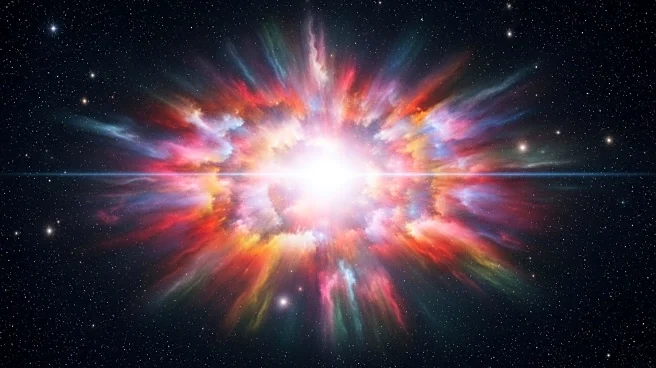What's Happening?
Physicists have proposed a new model suggesting that the universe may end in a 'Big Crunch,' a reverse of the Big Bang, due to evolving dark energy. The model, developed by researchers from Donostia International Physics Center, Shanghai Jiao Tong University, and Cornell University, indicates that the universe has a lifespan of 33.3 billion years, with less than 20 billion years remaining. This theory challenges the long-held belief that the universe will expand indefinitely. The cosmological constant, denoted as λ, plays a crucial role in this model. A negative λ could reverse the universe's expansion, leading to a collapse. The model also incorporates axions, ultra-light particles that influence the universe's expansion. As the axion's effect diminishes, the negative λ could dominate, causing the universe to contract.
Why It's Important?
This development is significant as it challenges existing cosmological theories about the universe's fate. If validated, it could reshape our understanding of dark energy and the universe's expansion dynamics. The implications extend to various scientific fields, including astrophysics and particle physics, potentially influencing future research directions. The concept of a finite universe lifespan raises philosophical and existential questions about the nature of existence and the universe's ultimate fate. It also underscores the importance of continued observation and data analysis to refine our understanding of cosmic phenomena.
What's Next?
Further research and data analysis are required to validate the evolving dark energy theory and the role of axions. Scientists will continue to observe cosmic phenomena to gather evidence supporting or refuting the model. The potential confirmation of a negative cosmological constant could lead to new theoretical developments in cosmology. Additionally, this research may prompt discussions among scientists and philosophers about the implications of a finite universe lifespan.
Beyond the Headlines
The proposed model highlights the complexity and uncertainty inherent in cosmological research. It raises ethical and philosophical questions about humanity's place in the universe and the significance of understanding cosmic beginnings and endings. The research also emphasizes the need for interdisciplinary collaboration to address the multifaceted challenges posed by evolving cosmic theories.











